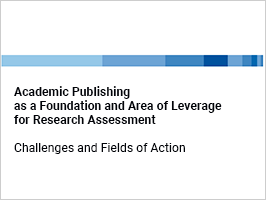Academic Publishing as a Foundation and Area of Leverage for Research Assessment
Academic publishing is one of the core functions of academic activity and therefore of the research system itself. As a funding agency for all branches of science and the humanities, the DFG is committed to the appropriate communication of scholarly outcomes and seeks to create suitable framework conditions for such communication.
The sector of academic publishing currently faces a number of challenges. These concern the visibility of published scholarship, unfavourable market structures and business practices, the development of new mechanisms of quality assurance and assessment, and the way in which the funding of scholarship is linked to its assessment based on publishing metrics. In particular, the assessment of scholarship based on bibliometrics can provide problematic incentives, thereby preventing the system of academic publication and research as a whole from developing in a way that is appropriate to its purpose.
The fundamental functions of academic publishing are to publicise, quality review and document academic findings and to attribute authorship and reputation. A publishing system that is appropriate to its purpose includes free choice of the form and venue of publication, the securing of exploitation rights by those publishing, and ensuring open access to the published material.
The preservation and promotion of such a system can only succeed if the underlying procedures for assessing scholarship draw on a broad spectrum of academic productivity rather than reflecting a narrow focus on bibliometric indicators. Only where assessment procedures are sufficiently oriented towards the content of research is it possible to ensure that the entire spectrum of publication forms and venues is driven by scholarship. At the same time, this entails effort and responsibility on the part of the academic community to safeguard and document the quality and value of research in its entire breadth.
The task of scholarship is therefore as follows:
In the digital environment with its numerous new publication options and venues, the issue of the appropriate quality review of published scholarship and publication venue must also be revisited. Authors of publications are responsible for ensuring the quality of the underlying research process and documenting this transparently. At the same time, it is up to them to choose academically and qualitatively appropriate venues for the publication of their research findings: this ensures that the fundamental procedures for high-quality, re-usable publication are adhered to and conveyed in a transparent manner. In this way, authors have the legally binding assurance that published content can be used in full in digital working environments.
Academic publishing takes place at different stages of the academic process, ranging from initial and consolidated results to final, stable outcomes. The target groups of academic publications cover a broad spectrum, from narrowly defined specialist groups to the entire academic community and indeed the public at large. For this reason, it is essential that the relevant target group is specifically addressed in each case in terms of format, text type, publication channel and readability of content. Meanwhile, aspects such as impact and reputation should not be the primary factors guiding the choice of publication venue.
A narrow focus in the system of attributing academic reputation – for example based on bibliometric indicators – not only has a detrimental effect on publication behaviour, it also fails to do justice to scholarship in all its diversity. Academic reputation is based not just on a broad range of publication types: it also includes contributions to the academic community and broader public interest, as well as the assumption of responsibility and taking on tasks such as coordination and management. These differing aspects should also be appropriately recognised as part of assessment procedures.
In many instances, the current publication system favours the diverse findings and results of scholarship being produced by academics but then placed in the hands of commercial providers for the purpose of publication. Here, it is important for scholarship to establish autonomous control over its own publications and the relevant use traces, making data collection more transparent or organising the process itself so as to avoid dependencies. Otherwise such dependencies are bound to be reflected in the context of assessment when the products of commercial providers are used.
The funding agencies – including the German Research Foundation – have a responsibility to:
In terms of publication formats, it is crucial for a good match to be achieved between the content to be conveyed and the target group. Responsible scholarship assessment should provide support here by explicitly accepting the entire spectrum of academic publications. At the same time, there should be no incentive for giving preference to certain publication formats or venues simply because they promise an advantage in terms of peer review or evaluation.
Responsible assessment of scholarship is based on the content of academic output. It is not derived from any standardised procedure for publishing academic findings, so it should deliberately refrain from setting any incentives to align academic activity and publication types with the assessment procedure.
Readers should be able to search for and find academic publications in an appropriate way and select them according to content-based criteria. However, the large-scale commercial search systems currently in use do not come close to reflecting the publication system in its entirety. For this reason, it is important to continue to support scholarship-driven activities that seek to develop services for specialist research, make academic information available and develop the infrastructures required for this purpose.
Position Paper

The position paper describes the main background aspects and factors involved in the current publishing system, thereby contributing to its further development in a way that is appropriate to scholarship..
Background:
The DFG’s positioning is based on the work done by an Executive Committee working group which looked into the subject of academic publishing and the assessment of scholarship in 2020 and 2021. Its analyses and recommendations for action were summarised in a position paper that the DFG Senate adopted in March 2022.
Further information:
- FAQ: Publishin(interner Link)
- Guidelines for Safeguarding Good Research Practic(externer Link)
- Positioning of the DFG on “Open Science as Part of Research Culture(externer Link)
- The DFG on Open Acces(interner Link)
- DFG funding in the area of Scientific Library Services and Information System(interner Link)
- San Francisco Declaration on Research Assesment (DORA(externer Link)
Contact and feedback
We welcome feedback on the positioning. Input will be collected by the Head Office and made available to the Senate. Please send your comments and statements to
| E-mail: | publikationswesen@dfg.de |
